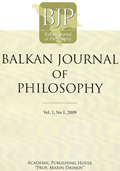The Contributions of Chinese Yin-Yang Thinking to the Contemporary Dialogue Between Science and Religion
The Contributions of Chinese Yin-Yang Thinking to the Contemporary Dialogue Between Science and Religion
Author(s): Wang Zhihe, Liu Xiaoting, Fan MeijunSubject(s): Language and Literature Studies
Published by: Институт по философия и социология при БАН
Keywords: Yin-Yang Thinking; Chinese Philosophy; Science and religion; Taoism; Process Philosophy; Constructive postmodernism; non-dualistic thinking.
Summary/Abstract: As a non-dualistic but holistic and harmonious way of thinking, Chinese Yin-Yang Thinking can make great contributions to the contemporary dialogue between science and religion, especially in its emphasis on interdependence, mutual complementarity, and mutual transformation. It can help us understand the complex and multifaceted relationship between science and religion, and provides a middle way to move beyond the impasse between scientism and religious fundamentalism. This paper explores the following three contributions that Yin-Yang Thinking can make to the contemporary dialogue between science and religion: 1. Yin-Yang Thinking can help deconstruct the dichotomy between science and religion by showing the interpenetration between them; 2. Yin- Yang Thinking can help promote synergy between science and religion by showing how they can complement and learn from each other; 3. Yin-Yang Thinking can help establish a partnership between science and religion in order to create an ecological civilization. The paper also explores the question of why such a valuable philosophical concept has been suppressed in China for almost a century.
Journal: Balkan Journal of Philosophy
- Issue Year: VI/2014
- Issue No: 2
- Page Range: 117-126
- Page Count: 10
- Language: English

